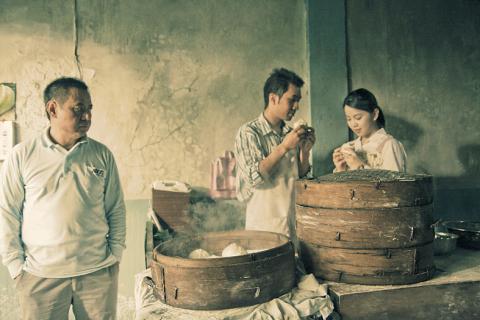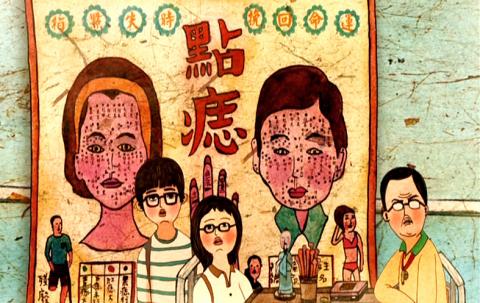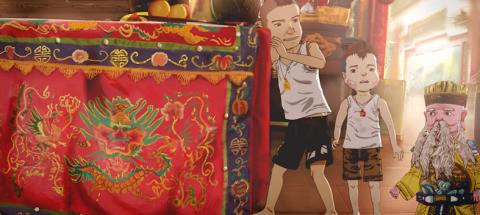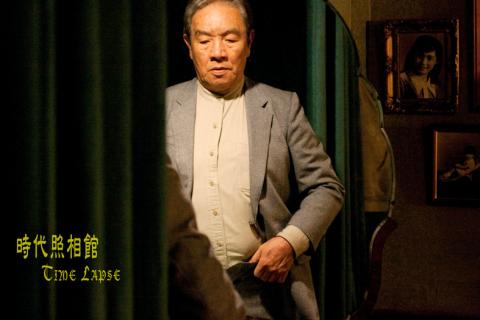Taiwanese cinema is experiencing a revival. University film courses are expanding and becoming more popular and young filmmakers are making their presence felt. In another sign of an emerging cinematic renaissance, entries to the Golden Harvest Awards (金穗獎) have risen from 115 in 2008 to 215 this year.
“The Golden Harvest has grown from a small event to an arena of competition between filmmakers,” said film critic Tien Kuo-ping (田國平), who is also known as Pin Chiung Nan (貧窮男).
Fifty selected films will compete in five categories (fiction, animation, documentary, experimental and student films) for a total of NT$3 million in prize money at this year’s Golden Harvest Awards.

Photo Courtesy of Chinese Taipei Film Archive
The awards ceremony will take place at the Plum Wine Factory (烏梅酒廠), Huashan 1914 Creative Park (華山1914), on March 25.
As well as more entrees than previous editions, the quality of the films has risen, said Tien. Animation in particular continues to grow more mature and polished in terms of technique and styles, eclipsing contenders in the feature, documentary and experimental sections, said Tien, though he added that the role of storytelling often takes a back seat.
Covering a gamut of topics from history and Aboriginal culture to the environment and biography, the documentary category nominees are diverse in subject matter but offer few surprises and lack developed viewpoints, according to Tien.

Photo Courtesy of Chinese Taipei Film Archive
Experimental cinema, as usual, occupies an obscure corner of the annual competition, whose jury members are mostly film professionals and scholars who may not be familiar with experimental filmmaking techniques.
The festival runs until March 27, after which it will tour the rest of the country until May 13. For more information, visit the event’s Web site at www.movieseeds.com.tw or its blog at gha33.pixnet.net/blog.
Awards highlights

Photo Courtesy of Chinese Taipei Film Archive
Crossing the sentiMENtal Desert (焉知水粉)
Who says a student film can’t boast a top-notch cast? This graduation project, by Chang Teng-yuan (張騰元) from Shih Hsin University (世新大學), stars celebrated thespian Tsai Chen-nan (蔡振南) and polished film and theater actor Huang Jian-wei (黃健瑋) as a father (Tsai) and son (Huang) who become estranged after a young Vietnamese woman is hired to help out at the parent’s steamed bun shop.

Photo Courtesy of Chinese Taipei Film Archive
Magabahai (馬嘎巴海)
Music and the sounds of Nature are the biggest draws of this feel-good movie about friendship between an Amis tribe elder and an American cyclist. The fact that director Patrick Tu (杜均堂) is the son of renowned recording artist Tu Duu-chih (杜篤之) explains why the sound track is of such high quality. The film won the Best Short Film Golden Horse Award last year, which should be an inspiration to budding filmmakers.
The Other Side

Photo Courtesy of Chinese Taipei Film Archive
In this whimsically dark animation, female director Chen Chiu-ling (陳秋苓) paints a brooding portrait of one woman’s experience of growing up, breaking free from her domineering mother and escaping to the “other side” of the ghostly town in which she lives.
Time of Cherry Blossoms (櫻時)
Taiwan’s folk beliefs come to life in this well-crafted animation, which tells the tale of a boy who is accompanied on an adventure by celestial beings. The film shows a surprisingly mature style reminiscent of late Japanese animator Satoshi Kon’s works and is regarded as one of the strongest contenders in the Golden Harvest Awards’ best animation category.
Time Lapse (時代照相館)
This 30-minute film touches on the themes of life, death and memory through a bittersweet tale about an aging photographer, played by veteran actor Ting Chiang (丁強), and four teenage boys. Blessed with a polished script, smooth cinematography and emotive performances, Time Lapse has got off to a good start at this year’s Golden Harvest by winning a recommendation award, which is judged by bloggers and was introduced to the festival in 2007.

Mongolian influencer Anudari Daarya looks effortlessly glamorous and carefree in her social media posts — but the classically trained pianist’s road to acceptance as a transgender artist has been anything but easy. She is one of a growing number of Mongolian LGBTQ youth challenging stereotypes and fighting for acceptance through media representation in the socially conservative country. LGBTQ Mongolians often hide their identities from their employers and colleagues for fear of discrimination, with a survey by the non-profit LGBT Centre Mongolia showing that only 20 percent of people felt comfortable coming out at work. Daarya, 25, said she has faced discrimination since she

April 21 to April 27 Hsieh Er’s (謝娥) political fortunes were rising fast after she got out of jail and joined the Chinese Nationalist Party (KMT) in December 1945. Not only did she hold key positions in various committees, she was elected the only woman on the Taipei City Council and headed to Nanjing in 1946 as the sole Taiwanese female representative to the National Constituent Assembly. With the support of first lady Soong May-ling (宋美齡), she started the Taipei Women’s Association and Taiwan Provincial Women’s Association, where she

It is one of the more remarkable facts of Taiwan history that it was never occupied or claimed by any of the numerous kingdoms of southern China — Han or otherwise — that lay just across the water from it. None of their brilliant ministers ever discovered that Taiwan was a “core interest” of the state whose annexation was “inevitable.” As Paul Kua notes in an excellent monograph laying out how the Portuguese gave Taiwan the name “Formosa,” the first Europeans to express an interest in occupying Taiwan were the Spanish. Tonio Andrade in his seminal work, How Taiwan Became Chinese,

More than 75 years after the publication of Nineteen Eighty-Four, the Orwellian phrase “Big Brother is watching you” has become so familiar to most of the Taiwanese public that even those who haven’t read the novel recognize it. That phrase has now been given a new look by amateur translator Tsiu Ing-sing (周盈成), who recently completed the first full Taiwanese translation of George Orwell’s dystopian classic. Tsiu — who completed the nearly 160,000-word project in his spare time over four years — said his goal was to “prove it possible” that foreign literature could be rendered in Taiwanese. The translation is part of